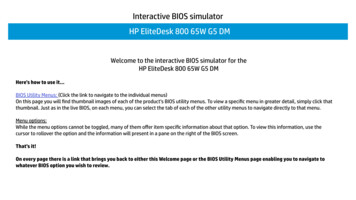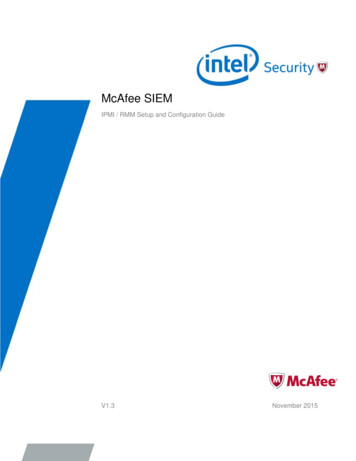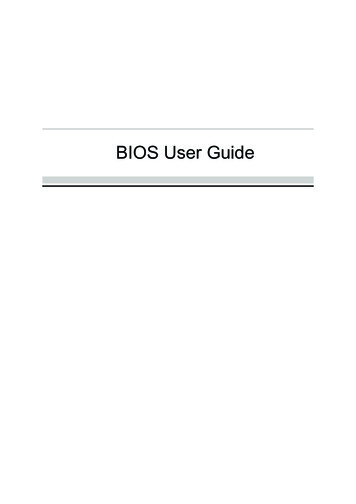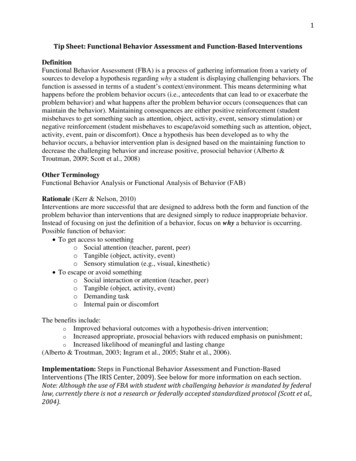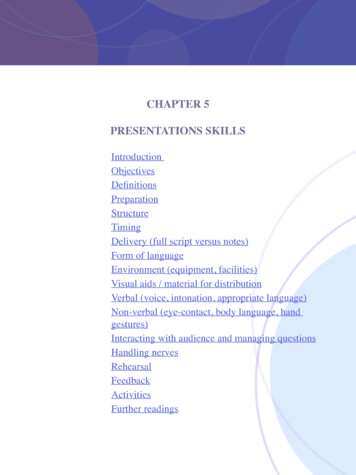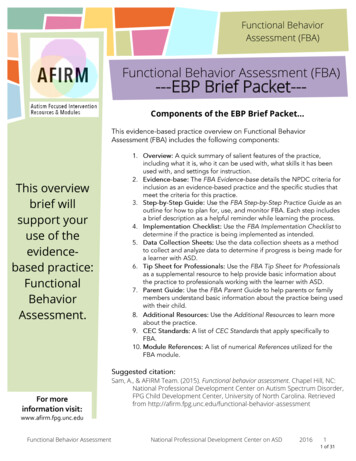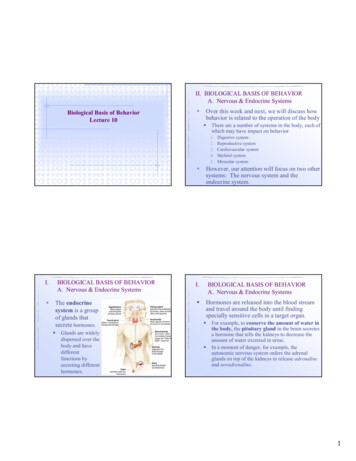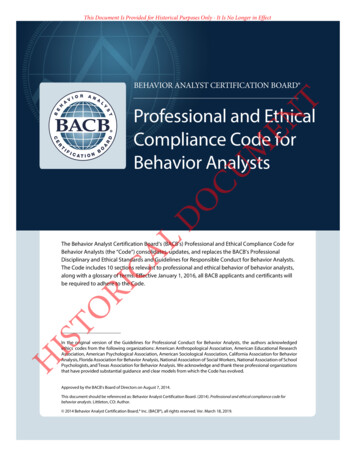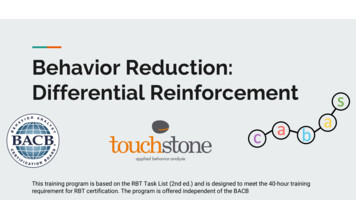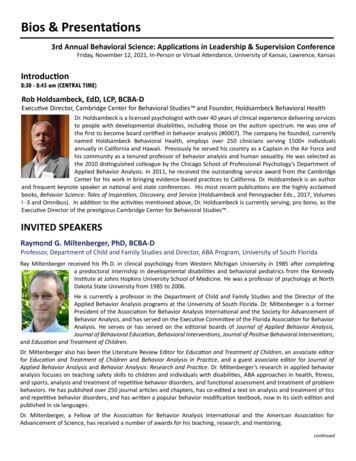
Transcription
Bios & Presentations3rd Annual Behavioral Science: Applications in Leadership & Supervision ConferenceFriday, November 12, 2021, In-Person or Virtual Attendance, University of Kansas, Lawrence, KansasIntroduction8:30 - 8:45 am (CENTRAL TIME)Rob Holdsambeck, EdD, LCP, BCBA-DExecutive Director, Cambridge Center for Behavioral Studies and Founder, Holdsambeck Behavioral HealthDr. Holdsambeck is a licensed psychologist with over 40 years of clinical experience delivering servicesto people with developmental disabilities, including those on the autism spectrum. He was one ofthe first to become board certified in behavior analysis (#0007). The company he founded, currentlynamed Holdsambeck Behavioral Health, employs over 250 clinicians serving 1500 individualsannually in California and Hawaii. Previously he served his country as a Captain in the Air Force andhis community as a tenured professor of behavior analysis and human sexuality. He was selected asthe 2010 distinguished colleague by the Chicago School of Professional Psychology’s Department ofApplied Behavior Analysis. In 2011, he received the outstanding service award from the CambridgeCenter for his work in bringing evidence-based practices to California. Dr. Holdsambeck is an authorand frequent keynote speaker at national and state conferences. His most recent publications are the highly acclaimedbooks, Behavior Science: Tales of Inspiration, Discovery, and Service (Holdsambeck and Pennypacker Eds., 2017, VolumesI -3 and Omnibus). In addition to the activities mentioned above, Dr. Holdsambeck is currently serving, pro bono, as theExecutive Director of the prestigious Cambridge Center for Behavioral Studies .INVITED SPEAKERSRaymond G. Miltenberger, PhD, BCBA-DProfessor, Department of Child and Family Studies and Director, ABA Program, University of South FloridaRay Miltenberger received his Ph.D. in clinical psychology from Western Michigan University in 1985 after completinga predoctoral internship in developmental disabilities and behavioral pediatrics from the KennedyInstitute at Johns Hopkins University School of Medicine. He was a professor of psychology at NorthDakota State University from 1985 to 2006.He is currently a professor in the Department of Child and Family Studies and the Director of theApplied Behavior Analysis programs at the University of South Florida. Dr. Miltenberger is a formerPresident of the Association for Behavior Analysis International and the Society for Advancement ofBehavior Analysis, and has served on the Executive Committee of the Florida Association for BehaviorAnalysis. He serves or has served on the editorial boards of Journal of Applied Behavior Analysis,Journal of Behavioral Education, Behavioral Interventions, Journal of Positive Behavioral Interventions,and Education and Treatment of Children.Dr. Miltenberger also has been the Literature Review Editor for Education and Treatment of Children, an associate editorfor Education and Treatment of Children and Behavior Analysis in Practice, and a guest associate editor for Journal ofApplied Behavior Analysis and Behavior Analysis: Research and Practice. Dr. Miltenberger’s research in applied behavioranalysis focuses on teaching safety skills to children and individuals with disabilities, ABA approaches in health, fitness,and sports, analysis and treatment of repetitive behavior disorders, and functional assessment and treatment of problembehaviors. He has published over 250 journal articles and chapters, has co-edited a text on analysis and treatment of ticsand repetitive behavior disorders, and has written a popular behavior modification textbook, now in its sixth edition andpublished in six languages.Dr. Miltenberger, a Fellow of the Association for Behavior Analysis International and the American Association forAdvancement of Science, has received a number of awards for his teaching, research, and mentoring.continued
Bios & Presentations2continued Raymond G. Miltenberger, PhD, BCBA-D8:45 - 9:45 am (CENTRAL TIME)“The Limits of Staff Management: What Happens When You’re Not There?”This presentation will discuss the issue of reactivity in staff management research. The potential problem is that the effectsof staff management interventions are evaluated when a researcher is present to collect data, thus risking reactivity toobservation as a potential confounding variable in much of the research. The talk describes the issue of reactivity andthe need for better assessment of staff performance that does not pose the risk of reactivity. The presentation discussesresearch on reactivity in staff management that illustrates the problem, discusses potential solutions to the problem, andcalls for more research to address the problem.Learning Objectives - At the conclusion of this presentation, participants will be able to: Describe reactivity as it may occur in staff management.Describe research that evaluates reactivity in staff management.Describe why reactivity is a problem in research and practice.Describe possible solutions to the problem of reactivity.Lori Diener-Ludwig, PhDChief Human Performance Engineer, Performance AllyDr. Lori Diener-Ludwig is known as a world-class expert in behavioral systems design because of herunique ability to help organizations manage complexity and execute their strategy with OrganizationalBehavior Management (OBM) solutions. She is the Chief Human Performance Engineer and a cofounder of Performance Ally, an organization whose mission is to create happy, high-performingworkplaces with their app, Ally Assist, a real-time performance management enterprise solution. Herleadership in developing this app is indicative of her longtime efforts to mainstream the science ofOBM in ways that help companies harness the tremendous power of human performance.Prior to joining Performance Ally, Lori spent 20 years working across numerous industries such asautomotive, human services, medical diagnostics, non-profit, oil and gas, and print in companies ofall sizes, from global Fortune 500s, creative start-ups, non-profits to local small businesses. The scope of her projectsranged from designing large scale performance-based learning strategies and programs for global clients to leading nonprofit and small-business leaders in the development of strategic plans, impact metrics dashboards, and core strategies.She has transformed dozens of organizations by helping them build their value and grow their revenue, gain new strategicpartnerships, develop compelling marketing messaging, increase collaboration, and focus on the execution of strategicplans.Lori is also the founder of Performance Blueprints, an organization whose mission is to disseminate the science and practiceof Behavior Systems Analysis to optimize the impact of organizations. Performance Blueprints nudges the science forwardthrough numerous peer-reviewed publications, edited books, research, conference presentations, book chapters, andprofessional activities within the University of North Carolina and Western Michigan University systems, the Association forBehavior Analysis International, Cambridge Center for Behavioral Studies, Organizational Behavior Management Network,and the Journal of Organizational Behavior Management. In 2014, Performance Blueprints was honored to receive theGeary Rummler Award for the Advancement of Performance Improvement from the International Society for PerformanceImprovement.Lori earned her B.S. in Psychology and Creative Writing, M.S. in Industrial Organizational Psychology and Ph.D. in AppliedBehavior Analysis from Western Michigan University. She currently serves as a Trustee of the Cambridge Center forBehavioral Studies, President for the Organizational Behavior Management Network, and a Board Member of Blue RidgeWomen in Agriculture.Easy Access Online Continuing EducationThe Cambridge Center for Behavioral Studies has over 150 continuing education courses availableonline. Through collaboration with the University of West Florida, Center for Behavior Analysis,our Continuing Education course series is designed to provide instruction in a variety of areas ofbehavior analysis.Available through www.behavior.org or uwf.behavior.orgFREE videos & podcast
Bios & Presentations3continued Lori Diener-Ludwig, PhD10:00 - 11:00 am (CENTRAL TIME)“Shaping Vital Behaviors of Leaders to Achieve Organizational Results?”The consistent, collective actions of leaders can significantly impact an organization’s results. In a meta-analysis of multipleorganizations conducted by Dr. Laura Methot and her colleagues, results showed that behavioral variability in coreleadership behaviors accounted for more than half of the variance in employee behaviors. Specifically, when 85% or moreof leaders build fluency in performance-focused behaviors, up to a 52% increase in employee behavioral momentum canbe realized (a measure of the rate of behavior change over time). The collective momentum of leadership and employeebehavior change can generate superior results at the organizational level. Sustaining these results requires consistentperformance coaching by leaders and alignment across leaders in the organization. This presentation will share sometechniques to shape collective vital behaviors of leaders to create and sustain behavioral momentum and discuss futureresearch opportunities.Learning Objectives - At the conclusion of this presentation, participants will be able to: Identify three basic things employees need to align their behaviors to reliably execute business strategy that leadersstruggle with. Describe at least one technique to measure the quality of leader performance coaching. Identify examples of leader vital behaviors.Terry McSween, PhDPresident & CEO, Quality Safety EdgeDr. Terry E. McSween is President and CEO of Quality Safety Edge, an organization that helps improvebusiness success and profitability through behavioral safety and safety leadership. Dr. McSweenhas received numerous awards for his work in safety improvement. He received the 2009 Life TimeAchievement and 2001 Significant Contribution awards from the Organizational Behavior Network.The American Society of Safety Engineers awarded him the Johnson & Higgins Scrivener Award for theoutstanding technical article on safety. His book, The Values-Based Safety Process, second edition, waspublished in 2003 by John Wiley & Sons of New York, NY and remains the best book on implementingbehavior based safety in organizations. He also started and maintained the Behavioral Safety Nowconference for over 25 years and represents the Cambridge Center for Behavioral Studies in workingto integrate BSN into the Safety In Action conference.11:15 am - 12:15 pm (CENTRAL TIME)“Visible Leadership – What Do We Do”Dr. McSween will review studies on safety and leadership and their implications for the practice of leadership. Severalstudies show the importance of the front-line supervisors and their relationship with their direct reports. The context ofthis relationship is predictive of both employee retention, safety, as well as other performance metrics. Systems oftenimpose administrative requirements that keep supervisors in their offices and prevent them from spending time in workareas. Several studies show that effective leaders are the ones that spend the most time with their direct reports. Bullying,criticizing, and nagging are common practices that damage relationship (often related to the emotional byproducts ofnegative reinforcement and punishment inherent in these practices). Positive feedback is often viewed as the solutionbut can be ineffective in the context of a damaged relationship. The solution is found in the kind of questions that getasked and the listening that occurs, often prior to discussions of expectations or feedback. These practices are often moreeffective reinforcement than many of the simple positive feedback models taught by some practitioners.Learning Objectives - At the conclusion of this presentation, participants will be able to: Describe at least two common “systemic” barriers to effective leadership. Discuss at least three practices that have a chilling effect on collaboration and problem solving. Describe two or more practices that contribute to a leader’s effectiveness.
Bios & Presentations4Amber Valentino, PsyD, BCBA-DChief Clinical Officer, Trumpet Behavioral HealthIn 2008, Amber Valentino received a doctoral degree in clinical psychology from Xavier University inCincinnati, OH. She completed a predoctoral internship and postdoctoral fellowship at the MarcusAutism Center/Children’s Healthcare of Atlanta in Atlanta, GA. After completion of her postdoctoraltraining, she remained at the Marcus Autism Center, serving as program coordinator of a communityautism parent training program and as a senior psychologist in a language and learning clinic.In 2012, she transitioned to Trumpet Behavioral Health where she has held various leadershippositions. She currently serves as the Chief Clinical Officer for Trumpet Behavior Health. In this role,she oversees clinical services, all research and training initiatives and builds clinical standards for theorganization. Dr. Valentino’s clinical and research interests include the assessment and treatment ofverbal behavior, primarily in children with autism. She is also interested in evaluation of programming to address uniqueadaptive skill deficits, and in developing standards for effective supervision in the field.Dr. Valentino, BCBA-D, currently serves as an Associate Editor for Behavior Analysis in Practice and previously served as anAssociate Editor for The Analysis of Verbal Behavior. She serves as a frequent guest reviewer for several behavior analyticjournals.1:15 - 2:15 pm (CENTRAL TIME)“On Being a Banded Mongoose: Elevating Supervisory Practices for the Next Generation ofBehavior Analyst”The way in which supervision is delivered and experienced in our profession can influence the quality of services behavioranalysts provide, funding, and the impression of our sciences to the general public. This influence is particularly evidentfor the supervisory experience that occurs prior to an individual becoming professionally certified, though it is relevantfor any supervisory relationship. The supervision experience should be considered one that is far-reaching—above andbeyond simply meeting a necessary requirement. Behavior analysts should honor the gravity of the role of a supervisor andtake direct responsibility for ensuring supervision is of the highest quality. In the past 7-8 years, we have made great stridesin defining and further conceptualizing the role of a supervisor. However, especially when compared to other professions,our literature base on supervision is still quite new and our ideas still evolving. In this presentation, I will review pertinentliterature on behavior analytic supervision and its implications. Then, I will provide recommended supervision practices tohelp elevate your supervision to the next level.Learning Objectives - At the conclusion of this presentation, participants will be able to: List at least 3 recommended supervision practices. Describe 1 category of supervision research. List at least 2 areas that quality of supervision can impact.
Bios & Presentations5Timothy Ludwig, PhDAppalachian State University & Safety-Doc.comTimothy Ludwig earned his Ph.D. at Virginia Tech under E. Scott Geller continuing his post-doctoralwork in industrial engineering studying applications of W. Edwards Deming to quality and safetyimprovement. Dr. Ludwig is a past Editor of the Journal of Organizational Behavior Management andformer president of the Organizational Behavior Management Network. His popular website SafetyDoc.com is a content-rich resource of safety culture stories, blogs, research, videos, and services. Dr.Ludwig serves on the Board of the Cambridge Center for Behavioral Studies (CCBS) where he leadsthe Commission on Behavioral Safety that reviews and disseminates best-in-industry safety practices.Dr. Ludwig is a Distinguished Graduate Professor at Appalachian State University where he teaches inthe nationally recognized Industrial/Organizational Psychology and Human Resources ManagementMasters program. Dr. Ludwig’s teaching has been recognized with the North Carolina University Board of Governors’Excellence award and has been inducted into the University’s Academy of Outstanding Teachers.Dr. Ludwig is the author of over 50 scholarly articles in Organizational Behavior Management that empirically documentthe successes of methods to improve safety and quality in industry through behavior systems design. His books includeIntervening to Improve the Safety of Occupational Driving (2001), Behavioral Systems: Understanding Complexity inOrganizations (2010), Behavioral Science Approaches to Process Safety: A Response to Industry’s Call (2018), DysfunctionalPractices that Kill your Safety Culture (2018), and The Science and Practice of Behavioral Safety: Reducing Injury on theFront Line (in press).Dr. Ludwig has over 30 years experience in research and practice in Organizational Behavior Management where heintegrates empirical findings into his consulting. Within his consulting practice Dr. Ludwig has helped assess, design, andimplement behavioral systems, behavioral safety and quality improvement programs in over 50 companies worldwide. Dr.Ludwig has delivered over 50 of his popular keynote presentations in 15 countries worldwide.Dr. Ludwig’s book Dysfunctional Practices is available through the CCBS Store online.2:30 - 3:30 pm (CENTRAL)“Dysfunctional Practices that Kill Your Work Culture (and What to do About Them)”Our tendency is to blame workers for errors and label their personal failings as the cause of the error. Labeling does notsolve problems that cause error and, frankly, it may all be an illusion of human perception leading us to false conclusions.Our human tendencies result in interactions that hurt the culture among our workers and the effectiveness of the systemswe put in place to support them. These tendencies build dysfunctional management practices that create fear associatedwith your workplace programs. I want to teach you a better way to analyze the behaviors of your employees to understandwhy they were put in a position to engage in the behaviors related to errors in the first place. Your system may be perfectlydesigned to promote risks and create error traps. We will build alternatives to labeling with dispassionate and actionableanalyses to help build systems that help workers discriminate the best behaviors for the situation. By analyzing the contextof behavior we can discover ways to change your system to optimize behavior related to employee performance.Learning Objectives - At the conclusion of this presentation, participants will be able to: Describe the dysfunctional practices that harm work cultures including labeling, blaming, single data-pointmanagement, and instilling fear through negative reinforcement. Define behavior in the context of the work environment. We first define behaviors in a way that are as open tounbiased analysis as the elements of physics and chemistry. We define behavior as a dynamic variable, reactingevery moment along predictable paths in the context of environmental events. Describe sources of Behavioral Variance such as behavioral variants of productive work behavior; those alternativecompeting behaviors that put your products and services at-risk. Discriminate the context when analyzing the causes of behavior. We analyze the work context behaviors tounderstand why the worker was put in position to take the risk and/or avoid the desired behavior. Determine the system variable that need adapting to change behavior on a permanent basis across all workers.We determine the management systems that need to be abolished, adapted, or built to change work contexts thatencourage risk to ones that influence desirable decisions.
Bios & Presentations6PANELMODERATOR: Thomas Zane, PhD, BCBA-DDirector of Online Behavior Analysis Programs, Department of Applied Behavioral Science, University of Kansas.Dr. Thomas Zane is the Director of Online Behavior Analysis programs in the Department of AppliedBehavioral Science at the University of Kansas. Dr. Zane earned his Bachelor’s and Master’s degreein psychology at Western Michigan University and his doctorate in Applied Behavior Analysis atWest Virginia University. He has served as a Post-Doctorate Research Associate at the University ofMassachusetts, Professor at Mount Holyoke College, and Johns Hopkins University Department ofPsychiatry. Dr. Zane serves on the Executive Board of the Cambridge Center for Behavioral Studies, theinternational organization that represents the field of behavior analysis. He is also a member of theScientific Council of the Organization of Autism Research, a group that raises money to fund innovativeresearch in Autism Spectrum Disorders. Dr. Zane has been past President of the Ethics Special InterestGroup of the International Association for Behavior Analysis. His research interests include teacher training, learning,evidenced-based practice in autism, and the philosophy of science and radical behaviorism.Claudia L. Dozier, PhD, BCBA-DAssociate Professor, Department of Applied Behavioral Science at the University of KansasDr. Claudia Dozier is a Professor in the Department of Applied Behavioral Science at the University ofKansas. Dr. Dozier received her bachelor’s degree from Florida State University, master’s degree fromUniversity of Nevada, Reno, and her doctoral degree from the University of Florida. Dr. Dozier’s areasof research include assessment, treatment, and prevention of behavior disorders, as well as schedulesof reinforcement, and preference for and reinforcer efficacy of stimuli (e.g., social interaction). Dr.Dozier is Co-Director of the Edna A. Hill Child Development Center at the University of Kansas. Inaddition, she and her graduate students provide consultation services to a large residential programserving adults with intellectual and developmental disabilities where they also have a clinical researchlab. She has served as an associate editor for the Journal of Applied Behavior Analysis and serveson the editorial boards of several other behavioral journals. In 2020, Dr. Dozier received the Steeples Service to KansansAward for her service to the people of Kansas as a purposeful extension of her teaching and research. Recently, she andher colleagues received a 2.5 million federal grant to provide telehealth services to families with children with autism whoengage in disruptive repetitive behavior.Pamela L. Neidert, PhD, BCBA-DAssociate Professor, Department of Applied Behavioral Science at the University of KansasMy experience prior to joining the KU Faculty in 2008 generally has involved assessment and treatmentof problem behavior and skill acquisition in children and adults with developmental disabilities. As aresult, I am very interested in early intervention and prevention. Currently, my research focuses onstrategies to facilitate development of critical skills in very young children and evaluate the effectsof proactive approaches to prevent the emergence of problem behavior. Specific areas of interestinclude facilitative strategies for the development of language, social skills (imitation/attention), andself-help skills (sleeping, toileting, feeding) in both typically developing children and those at risk for,or diagnosed with, disabilities.continued
Bios & Presentations7continued Panel PresentationJomella Watson-Thompson, PhDAssociate Professor, Department of Applied Behavioral Science at the University of KansasDr. Thompson holds a Ph.D. in Behavioral Psychology and a Masters of Urban Planning from theUniversity of Kansas. She applies behavioral science methods and interventions to improve howcommunities address issues related to community health and development. Her research hasfocused on neighborhood development, healthy youth development, and prevention, includingsubstance abuse and violence prevention. Dr. Thompson supports community capacity-buildingefforts to address social determinants of health through community-based participatory researchin urban neighborhoods and disparate communities. She has researched the effects of communitybased processes and intervention to promote mobilization and change in communities. Dr. Thompsonhas extensive experience providing training, technical support and evaluation for community-based3:45 - 4:45 pm (CENTRAL TIME)“From Campus to Community: Considerations for Effective Supervision and Leadership”The role of supervision in behavior analysis cannot be overestimated. Although the campus-based academic and knowledgepreparation is important, the community application of the principles of behavioral science is arguably more crucial. Itis through the process of supervision that students, new to behavior analysis, will see the relevance of the academicknowledge to real-life application, and have their clinical skills shaped most effectively. Given that questionable supervisorypractices are the number one complaint sent to the ABA ethics hotline, it is imperative for the proper development of thenext generation of behavior analysts, and for the continued development of our field, that supervision is done effectivelyand ethically. The three panelists who will be speaking are all in the position of leading organizations in which supervisionis extensively implemented. They will speak about their perspectives and practices regarding supervision of their studentsand employees in diverse contexts, including community-based programs focusing on health and development, centerbased programs for young children with and without disabilities, and research activities.Learning Objectives - At the conclusion of this presentation, participants will be able to: Describe some factors that influence effective supervision and leadership that are unique to academic and publiccontexts. Describe at least three commonly-found supervisory problems in the community. Describe at least three specific recommendations for effective supervisory and/or leadership competence.The Cambridge Center for Behavioral Studies is a non-profit 501(c)3 organization that harnesses the expertiseof hundreds of behavioral scientists to solve problems in the home, school, community, and the workplace.Our Mission: To advance the scientific study of behavior and its humane application to the solution of practicalproblems, including the prevention and relief of human suffering.behavior.orgThank you for supporting us through attendingour conferences, purchasing our publications,earning your continuing education through ourresources and donating.
Bios & Presentations8Continuing Education OpportunitiesTY S CNINEDUNCEIEHUMABACB SUPERVISION Learning CEUs (6.0)C AT I OCAMBRIDGE CENTERFORBEHAVIORAL STUDIESThe Cambridge Center for Behavioral Studies is an approved Type 2 CE Provider by the BehaviorAnalyst Certification Board (BACB ) and is authorized to offer 6.0 SUPERVISION CE units for thisconference. Continuing Education Provider No.: OP-04-0058Attendees must complete all six presentations in-person, virtually or throughrecordings available for 10 days post-conference for asynchronous home-study toearn CEs. (Partial credit will not be issued.) An evaluation and code quiz with a100% score needs to be completed for issuance of continuing education.Psychology CE Credits (6.0)Amego Prepare is a co-sponsor of this conference for Continuing Education Credits for Psychologists. Amego Prepare isapproved by the American Psychological Association to sponsor continuing education for psychologists. Amego Preparemaintains responsibility for this program and its content.Attendees must complete all six presentations in-person, virtually or through home-study* toearn Psychology CE Credits. (Partial credit will not be issued.) An evaluation and code quiz with a100% score needs to be completed for issuance of continuing education.*If you are completing the conference through recordings for home-study, there is a DIFFERENT processthrough Amego Prepare for those seeking a certificate for Psychology CE Credits. Contact MichaelWeinberg at MWeinberg@amegoinc.org.*It is the attendee’s responsibility to check with their State and Professional organization to confirm all CE offerings.If you paid for and are earning continuing education, you must follow instructions to submit codes & complete evaluationfor all six presentations.For BOTH In-Person and Virtual attendance, we need to verify your attendance.Each presentation will have three unique codes. You need to capture the codes. At the end of the conference, you will need to complete anelectronic evaluation and pass a code submission quiz (Google Form). You need to get all codes correct for all six (6) presentations/panel to earnyour Certificate. No partial credit is offered.The link to start the process is below. It will also be announced for in-person attendees and an email will be sent to all conference attendees at4:30 pm (EST) near the end of the conference with the link and instructions. The deadline for completing the online evaluation and code quiz isMonday, November 22, 2021 at 12 midnight (Eastern). Recordings will be available for 10 days post-conference. Links to be emailed Saturday,November 13. (If you are seeking Psychology CE Credits through home-study of recordings, the process is through Amego Prepare. Contact Dr.Weinberg at MWeinberg@amegoinc.org.)Click on the link below to start the process with your evaluation of our QLSdG form?usp sf link
and repetitive behavior disorders, and has written a popular behavior modification textbook, now in its sixth edition and published in six languages. Dr. Miltenberger, a Fellow of the Association for Behavior

